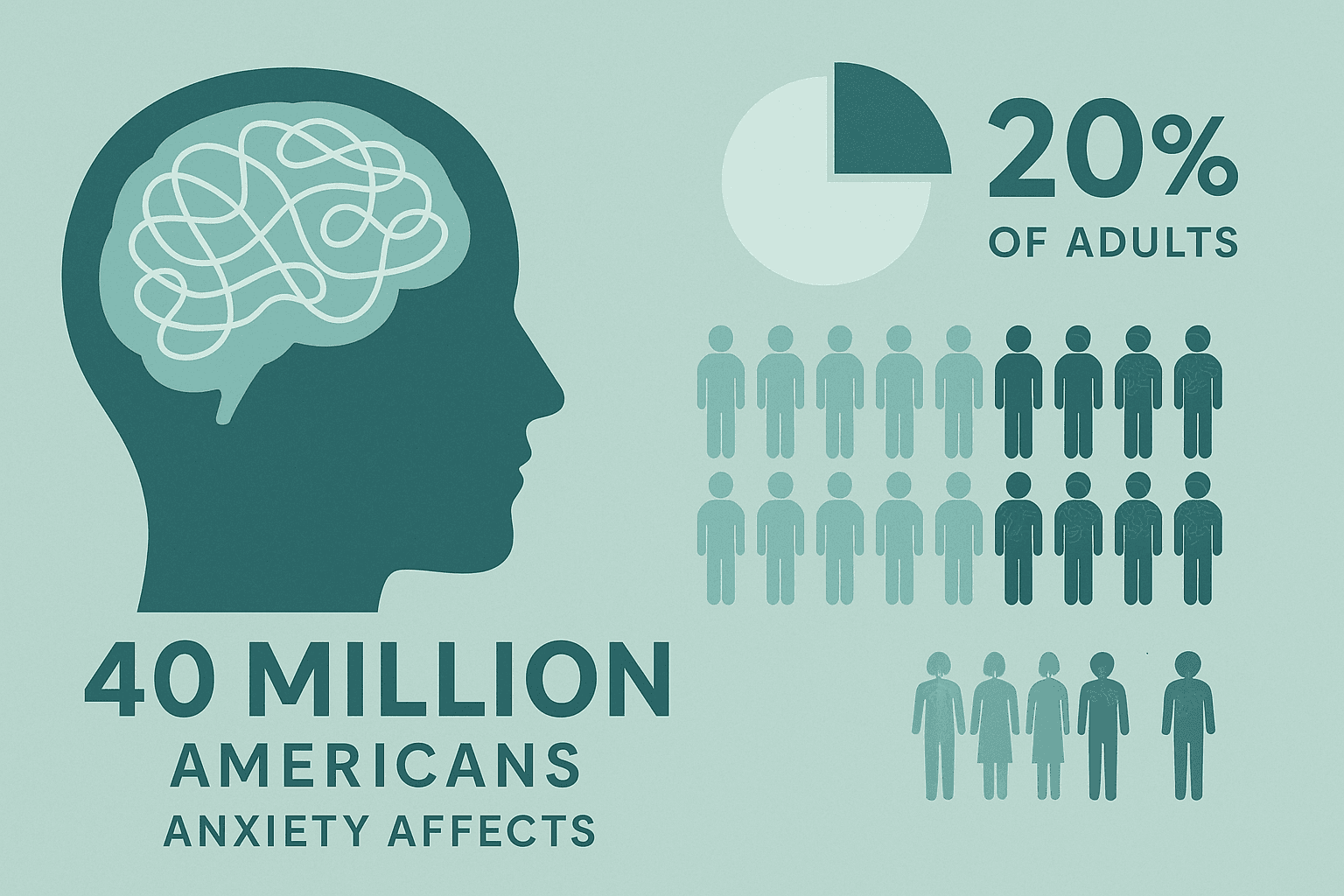March 28, 2025
Mental WellnessIn This Article
- Understanding Anxiety: The Mind-Body Connection
- 1. Ashwagandha: The Ancient Adaptogen
- 2. L-Theanine: Calming Compounds from Tea
- 3. Magnesium: The Relaxation Mineral
- 4. CBD Oil: What the Research Shows
- 5. Mindfulness Meditation: More Than a Trend
- Lifestyle Approaches That Complement Supplements
- Conclusion: Creating Your Anti-Anxiety Toolkit
Anxiety disorders are now the most common mental health concern in the United States, affecting approximately 40 million adults—nearly 20% of the population. While conventional treatments like therapy and medication are effective, many people seek complementary natural approaches, either as standalone solutions for mild anxiety or as adjuncts to conventional treatment for more severe cases.
The good news is that research in natural anxiety remedies has expanded significantly in recent years. Scientists are now uncovering the mechanisms behind traditional remedies and quantifying their effects through rigorous clinical trials. No longer dismissed as "alternative," many of these approaches are becoming mainstream as their evidence base strengthens.
In this article, we'll explore five natural approaches to anxiety that have substantial scientific support. We'll examine not just what works, but why it works, what the research tells us about dosing and effectiveness, and how these remedies might fit into a comprehensive anxiety management plan.

Important Note:While natural remedies can be effective for many people, they're not a replacement for professional treatment in cases of severe anxiety. If you're experiencing debilitating anxiety that interferes with daily functioning, please consult with a healthcare provider. This article is meant to be informational and shouldn't replace personalized medical advice.
1. Ashwagandha: The Ancient Adaptogen
Ashwagandha (Withania somnifera) has been used in Ayurvedic medicine for over 3,000 years, but it's only recently that modern science has begun to validate its impressive anxiety-reducing properties. This powerful adaptogen—a natural substance that helps the body adapt to stress—has shown remarkable benefits for anxiety in multiple clinical studies.
What the Science Says
- A double-blind, randomized controlled trial published in the Journal of Clinical Psychopharmacology found that participants taking ashwagandha extract (300mg twice daily) experienced a 56.5% reduction in anxiety scores, compared to only 30.5% in the placebo group.
- Another study showed that ashwagandha significantly reduced cortisol levels—a key stress hormone—by an average of 27.9% after 60 days of supplementation.
- Research published in PLOS ONE demonstrated that ashwagandha improved resistance to stress and enhanced quality of life in individuals with a history of chronic stress.
How It Works
Ashwagandha contains compounds called withanolides that appear to mimic the activity of the inhibitory neurotransmitter GABA—similar to how anti-anxiety medications work, but without the side effects. It also helps regulate the hypothalamic-pituitary-adrenal (HPA) axis, which controls our stress response, and reduces inflammation in the brain, which has been linked to anxiety and depression.
Effective Dosage
Most successful clinical studies have used 300-600mg of ashwagandha extract daily, typically standardized to contain 5-10% withanolides. Benefits are usually noticed within 2-6 weeks of consistent use, with effects building over time.

Who Should Be Cautious
- People with autoimmune conditions (may stimulate the immune system)
- Those with thyroid disorders (may increase thyroid hormone levels)
- People taking sedatives or thyroid medications
- Pregnant or breastfeeding women (insufficient safety data)

Double Wood Magnesium Complex Supplement
Complete magnesium blend with 8 different forms of magnesium (Citrate, Bisglycinate, Taurate, Oxide, Malate, L-Aspartate, Orotate, and Ascorbate) providing 100% daily value.
Buy on Amazon2. L-Theanine: Calming Compounds from Tea
Ever wondered why a cup of tea feels so soothing? Part of the answer lies in L-theanine, an amino acid found naturally in tea leaves (especially green tea). This compound has been studied extensively for its ability to promote relaxation without drowsiness—making it ideal for daytime anxiety management.
3. Magnesium: The Relaxation Mineral
Magnesium is often called "nature's relaxant" for good reason. This essential mineral plays a crucial role in regulating neurotransmitters that calm the brain and nervous system. Unfortunately, studies suggest that up to 50% of Americans don't get enough magnesium from their diet, which may contribute to anxiety symptoms.
Related Article: For an in-depth look at how magnesium affects sleep and relaxation, check out our article Magnesium for Sleep: How This Mineral Helps Your Body and Mind Rest Better.
Conclusion: Creating Your Anti-Anxiety Toolkit
Natural approaches to anxiety relief offer promising alternatives or complements to conventional treatments. The five remedies we've explored—ashwagandha, L-theanine, magnesium, CBD oil, and mindfulness meditation—all have substantial scientific evidence supporting their effectiveness.
Remember that anxiety management is highly individual—what works best for one person may not be ideal for another. Consider working with a healthcare provider who's knowledgeable about integrative approaches to find the right combination for your unique needs. With patience and persistence, natural remedies can be powerful tools in your journey toward greater calm and wellbeing.
You Might Also Like
Magnesium for Sleep: How This Mineral Helps Your Body and Mind Rest Better
Discover the science behind magnesium's powerful sleep-enhancing effects, including how different forms affect sleep quality, recommended dosages, and what studies reveal about its effectiveness.
Read ArticleStay Updated
Sign up for our newsletter to get the latest natural health insights, research updates, and science-backed wellness tips.

